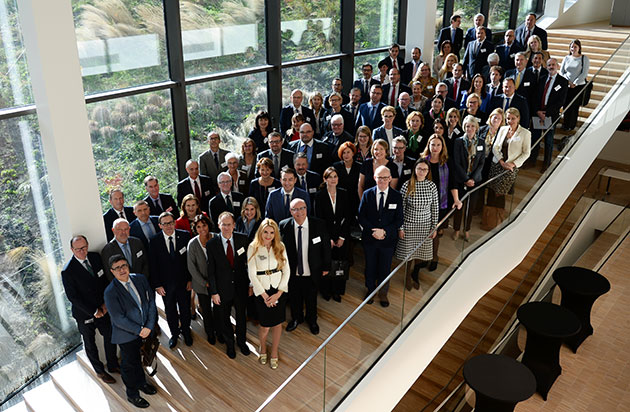 A joint investigation team (JIT) is one of the most advanced tools used in international cooperation in criminal matters, comprising a legal agreement between competent authorities of two or more States for the purpose of carrying out criminal investigations. Made up of prosecutors and law enforcement authorities as well as judges, JITs are established for a fixed period, typically between 12 and 24 months, such as is necessary to reach successful conclusions to investigations.
A joint investigation team (JIT) is one of the most advanced tools used in international cooperation in criminal matters, comprising a legal agreement between competent authorities of two or more States for the purpose of carrying out criminal investigations. Made up of prosecutors and law enforcement authorities as well as judges, JITs are established for a fixed period, typically between 12 and 24 months, such as is necessary to reach successful conclusions to investigations.
Providing operational, legal and financial support to JITs is a key part of Eurojust’s mission, together with enabling access to the expertise of the JITs Network, a network of relevant national experts, who encourage and promote best practice in the use of JITs. Eurojust also hosts the JITs Network Secretariat, which supports and stimulates the activities of the JITs Network. Since 2005, the Agency has supported national authorities in the setting up and running of JITs, and has provided funding from 2009, while also taking a leading role in promoting JITs and developing awareness and understanding around the tool and its use.
The recently appointed first European Public Prosecutor Ms Laura Kövesi visited Eurojust today to discuss future cooperation in combatting crimes against the financial interests of the Union. Ms Kövesi has a seven year mandate and will lead the European Public Prosecutor's Office (EPPO) in Luxembourg, which is expected to start its operations as of November this year.
Eurojust President Mr Ladislav Hamran stated: 'I welcome Ms Kövesi to The Hague and Eurojust, not only today, but also for the years to come in which we will cooperate extensively. With the establishment of the EPPO, we are entering a new phase in the efforts to combat crimes against the financial interest of the EU. In this new phase, the EPPO and Eurojust will have a joint responsibility and I look forward to working together harmoniously as two strong institutions.'
European Public Prosecutor Ms Laura Kövesi said: 'The European Public Prosecutor's Office and Eurojust have different, complementary competences and tools but the same assignment: to combat crime. I want the EPPO to become a centre of excellence for the seizure of criminal assets and a game changer in the fight against cross-border VAT fraud. I look forward to engaging into an efficient and pragmatic cooperation with Eurojust with this objective in mind.'
Photo © Eurojust
The EPPO will be an independent body of the EU, responsible for investigating, prosecuting and bringing to judgment crimes against the financial interests of the Union (e.g. fraud, corruption and cross-border VAT fraud above EUR 10 million). In this respect the EPPO will undertake investigations, carry out acts of prosecution and exercise the functions of prosecutor in the competent courts of the Member States.
There are 22 Member States participating in this enhanced cooperation of the EU (Austria, Belgium, Bulgaria, Croatia, Cyprus, Czech Republic, Estonia, Finland, France, Germany, Greece, Italy, Latvia, Lithuania, Luxembourg, Malta, The Netherlands, Portugal, Romania, Slovenia, Slovakia, Spain). The EPPO will grow to a level of 117 staff members.
14th Consultative Forum of Prosecutors General and Directors of Public Prosecutions
Prosecutors General from across the European Union gathered today at Eurojust to explore avenues of more effective judicial cooperation in the digital world and decide how to best ensure criminal justice in cyberspace. The Member States' representatives agreed on the importance of the implementation of practical measures, such as the ongoing project on Digital Criminal Justice, to cope with the challenges that cybercrime and digitalisation pose to investigations and prosecutions. This year's Consultative Forum, co-organised by Romania and Finland, the past and present Member States holding the EU Presidency, in cooperation with Eurojust, focused on how to optimise digital information sharing and exchange of e-evidence and address the issues of loss of location and loss of data in criminal cases due to the borderless nature of cybercrime.

Photo © Eurojust
Mr Ladislav Hamran, Eurojust's President, said: 'Cybercrime is one of the growing challenges we face in Europe. Cooperation in this field and improving the digitalisation of justice are essential to ensure prosecutors can keep track of criminal networks that often operate worldwide. Today's meeting was of great importance, as only by regular consultations will we be able to continue to build the right judicial network to combat criminal organisations that deal with cybercrime.'
Ms Raija Toiviainen, Finnish Prosecutor General, co-chairing the meeting, said: 'Prosecutors are practitioners, and are thus on the front line. Prosecution services must be able to satisfy the unique requirements for successfully prosecuting cybercrime. We need more training and human resources, especially for analysing huge amounts of data, so that we can support the entire chain of criminal proceedings. In addition, we need to work closely with Eurojust for an up-to-date review of the cybercrime situation. Eurojust offers expertise in its vast network of third country contact points as well as its in-house networks, including the European Judicial Cybercrime Network. Ultimately, we must get the proceeds of crime away from the perpetrators. Cybersecurity is a priority of the Finnish Presidency.'
Mr Razvan-Horatiu Radu, Romanian Deputy Prosecutor General, also co-chairing the meeting, said: 'Digitalisation is changing the future, and we need to master all the challenges it brings. It is not limited to just one particular sector of our society, but covers almost all of them, including criminal justice. Ensuring criminal justice, not only in cyberspace but also in general, requires strategic and operational responses. From this perspective, digitalisation has a positive potential to support prosecutors, as well as the entire law enforcement spectrum, to provide swift and effective responses to crime. It increases the ability to transmit information, data and evidence, as well as the accuracy and precision of the digital data transmitted.
Last, but not least, I would like to once again recall the great achievements obtained under the Romanian Presidency of the Council of the European Union within the field of electronic evidence in criminal matters. The very good results my colleagues have achieved during the Romanian Presidency give all of us today the opportunity to take further steps for future results in preventing and combating crime.'
Combating cybercrime: challenges and possible solutions
As cybercrime has no borders, and electronic evidence is often impossible to obtain or can be easily encrypted or deleted, speedier and more efficient judicial instruments and direct cross-border tools are indispensable. To this end, the Forum members supported the idea of closer cooperation among the judiciary and service providers and other stakeholders of the private sector, Eurojust, the European Judicial Cybercrime Network and Europol, as well as a more intensive use of joint investigation teams. Furthermore, investigators and prosecutors across Europe need to acquire special knowledge and expertise in the field of digital justice and keep abreast of all new digital developments.
The Forum members reflected on the interconnection of ongoing EU legislative proposals, as well as the key role of Eurojust in their implementation. The European Commission proposed a draft Regulation, which would enable judicial authorities to issue mandatory orders for data requests from service providers in other Member States, as well as a draft Directive on e-evidence to require service providers to appoint a legal representative within the European Union. The Forum members took note of the Commission's proposals, which are currently under scrutiny by the European Parliament.
In 2018, the US Congress adopted the CLOUD Act, which unlocks the possibility for foreign authorities to obtain electronic data from US service providers without resorting to mutual legal assistance (MLA) requests. Moreover, an additional Protocol to the Council of Europe's Budapest Convention would provide for a simplified and more efficient MLA procedure and direct cooperation with service providers in other jurisdictions.
Digital judicial cooperation
To target cybercrime more effectively, judicial authorities should make the best use of the latest digital communication technologies and secure online platforms for electronic data exchange. The Commission's Digital Criminal Justice project, for example, includes the establishment of an encrypted communication channel for transmitting real-time case-related information between Member States and Eurojust, and a central module to ensure cross-match and identification of correlations and links in cases investigated in more than one jurisdiction. The Forum members voiced their support for the practical implementation of the project, concentrating on the aspects of availability, confidentiality, integrity and interoperability of the information exchanged. In this context, the Forum participants also stressed the importance of the recently launched Judicial Counter-Terrorism Register at Eurojust.
Eurojust's way forward
At the closing session of the meeting, Mr Hamran presented the operational results and success stories of the EU's Judicial Cooperation Unit to date and informed the participants of, inter alia, the implementation of the new Eurojust Regulation, entering into force in December 2019, and cooperation with the European Public Prosecutor's Office as of 2020. Eurojust's Administrative Director, Nick Panagiotopoulos, emphasized the need for adequate funding for Eurojust in the coming years to ensure smooth implementation of the Digital Criminal Justice project and, most importantly, continuity in Eurojust's high-level service to justice.
